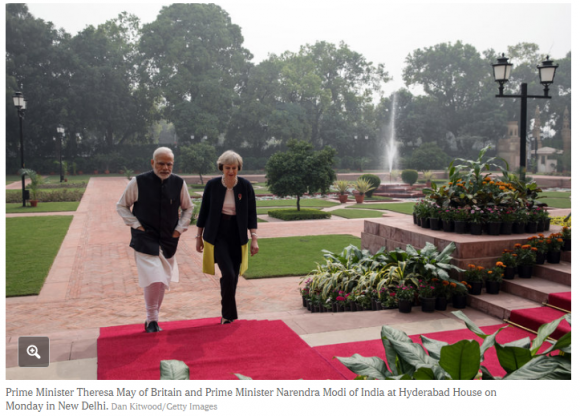Earlier this week British Prime Minister Theresa May traveled to India in hopes of working out what would be the country’s first trade deal after it leaves the European Union. In an article from the New York Times, it was said that negotiations began to falter over immigration, which was one of the controversial issues which influenced Britain’s decision to leave the European Union, (Bilefsky, 2016). Britain’s current views and policies on immigration hurt Indian businesses in Britain as well as Indian individuals seeking student visas which keep the UK and India from achieving a synergistic, mutually beneficial trade agreement.
Synergy is defined as “a cooperative or combined action, and occurs when diverse or disparate individuals or groups collaborate for a common cause. The objective is to increase effectiveness by sharing perceptions and experiences, insights, and knowledge”, (Moran, Abramson, & Moran, 2014, p. 266). Typically, high-synergy cultures engage in cooperative and community-oriented behaviors where both parties have the good of all in mind, (PSUWC, 2016). However, Britain’s current immigration policies reflect self-centered social arrangements where collaboration is not reinforced as desired behavior which is a characteristic of a society with low-synergy, (Moran, Abramson, & Moran, 2014, p. 267).
Indian business leaders have called upon British officials to reduce the cost of a two-year visa to Britain from $409 to $108, which is the rate applied to Chinese citizens. This policy has reduced the number of student visas issued to Indians from 68,238 in 2010 to 11,864 in 2015, (Bilefsky, 2016). The British government recently introduced visa restrictions that would raise the salary threshold for foreign companies seeking to transfer workers to Britain, which means any non-European Union worker earning less than £35,000 will be deported, (Bilefsky, 2016, Ferguson, 2016). This will hurt Indian information technology companies who need workers to be able to spend months in Britain while working on projects, (Bilefsky, 2016).
Trade between Britain and India can be negatively impacted as a result of the Brexit vote. Head of the Federation of Indian Chambers of Commerce and Industry, Alwyn Didar Singh, explained that exports from India to Britain were affected by the drastic fall of the pound following the vote to leave the European Union, (Bilefsky, 2016). Singh also expressed how the Brexit vote is an obstacle to the 800 Indian Businesses in Britain which viewed the country as a gateway to the European Union, (Bilefsky, 2016).
India’s Prime Minister Narendra Modi recently explained that “education and mobility across borders for young Indians would help define India’s relationship with Britain”, (Bilefsky, 2016). However, due to the Brexit vote British Prime Minister Theresa May is under pressure to reduce immigration. Allie Renison, the leader of trade policy at the Institute of Directors explains that May needs to understand that with higher education being one of Britian’s most successful exports, labor mobility and visas are essential for a service-based economy like Britain’s, (Bilefsky, 2016). If Britain cannot change its immigration policies to accommodate the needs Indian businesses as well as the individuals seeking visas then India and Britain cannot achieve synergy.
References
Bilefsky, D. (2016, November 7). Hopes for U.K. Trade Deal With India Hit a Snag: Immigration. Retrieved November 10, 2016, from http://www.nytimes.com/2016/11/08/world/europe/uk-britain-india-theresa-may-narendra-modi.html?rref=collection%2Ftimestopic%2FGreat%20Britain&action=click&contentCollection=world®ion=stream&module=stream_unit&version=latest&contentPlacement=8&pgtype=collection&_r=0
Ferguson, D. (2016, March 12). The non-EU workers who’ll be deported for earning less than £35,000. Retrieved November 10, 2016, from https://www.theguardian.com/money/2016/mar/12/eu-workers-deported-earning-less-35000-employees-americans-australians
Moran, R. T., Abramson, N. R., & Moran, S. V. (2014). Managing Cultural Differences (9th ed.). New York, New York: Routledge.
Pennsylvania State University World Campus (PSUWC) (2016). Lesson 6. Retrieved November 11, 2016, from https://psu.instructure.com/courses/1802572/modules/items/21179089


Your post was well written and enjoyable to read. After looking at the U.K.’s rankings according to Hofstede’s dimensions of culture, I am less surprised by the Brexit results. They rank high in individualism, with a score of 89, and relatively low in uncertainty avoidance, with a score of 35.
That tells me that as a country, they value individualism and are okay with uncertainty. Thus, breaking apart from the E.U., and being okay taking a chance since the outcome of that decision is “fraught with uncertainty” is not surprising (Taylor, 2016).
Interestingly, it is speculated that Brexit could lead to the break-up as the U.K. as we know it, considering there is a great divide within the countries of the U.K. regarding Brexit.
References
The Hofstede Centre [Website]. (n.d.). Retrieved from https://geert-hofstede.com/countries.html
Taylor, B. (2016, September 5). Brexit: the entire process is fraught with uncertainty. BBC News. Retrieved from http://www.bbc.com/news/uk-scotland-scotland-politics-37277621
I agree with you that Great Brittan wants to reduce its quota of immigrants. However, I believe they purposely don’t want anymore than they already have and Brexit was all about maintaining England’s culture by strengthening their borders. It is also related to extremest jihadist whom they don’t want in their country. Period. Maybe the reduction in Indian visas is in a direct correlation with the cutbacks they have with every other country.
However, synergy is not limited to immigration alone. It can be realized through the trade routes that they built centuries ago. Though the borders may be closed now, the internet is still open for business. Where there is a will, there will always be a way to create synergistic business relationships. These two countries are too big and interrelated for them to fail at navigating their way through these rough waters.
You are absolutely correct that Britain is not working towards synergy with India, a nation that they have had a lot of influence overt the course of history. They are also limiting the amount of diversity that they will be able to benefit from by reducing the amount of work visas that they are issuing as well especially in the fields of technology and medicine. I would imagine after a bit of time this will further strain business relationships for the two nations in addition to the impact will have on students ability to continue education there as well.